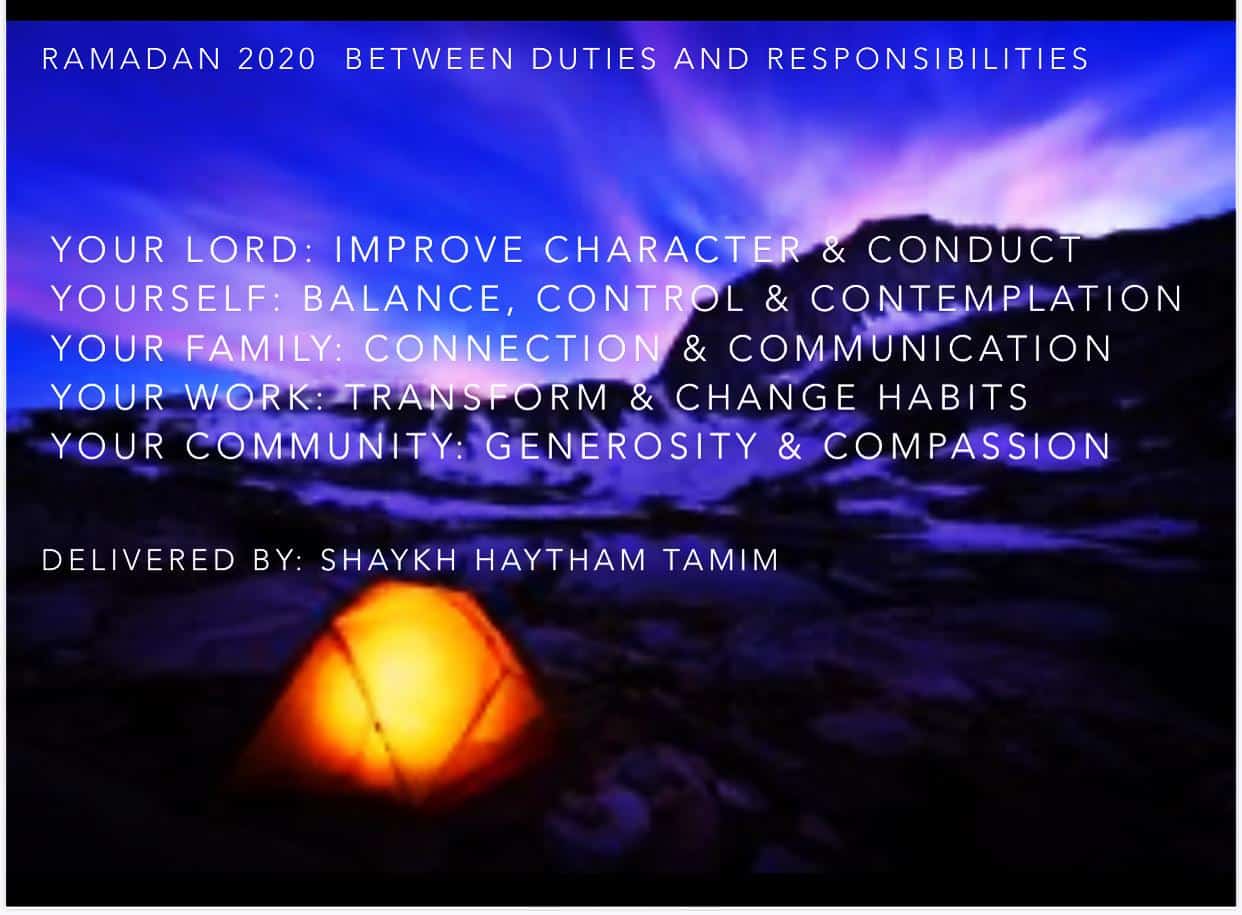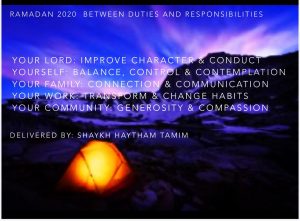Ramadan – a month of mindfulness

Month of mindfulness
Ramadan is about becoming more mindful of your Lord, mindful of your duties towards Him and towards His creation as well.
All the messages that were sent by God to humanity since Adam and Noah and Abraham, Moses, Jesus, and Muhammed (peace be upon them) were sent to make the human race improve their character and conduct.
Ramadan brings a heightened awareness of God in our lives.
How to have the presence of God in our life more. How to increase mindfulness in our life, as opposed to being oblivious to the presence of God in our life.
Duties and responsibilities towards ourselves
Our first responsibility is to our Lord and through acts of worship such as fasting, prayers and through His remembrance, as well as being charitable.
Food for the soul
These are the duties we have to fulfil towards Him, but we also have a responsibility and duty to ourselves. Ramadan brings balance and self-control to our life. We, as humans are comprised of both a body and a soul. Throughout the year we priortise the needs and wants of the body, and our desires over our souls, but in Ramadan we flip this and give precedence to the soul over the body and this redresses the balance. We can’t just be led by the body and the desires of the body, we have to feed the soul too and Ramadan is the food for the soul. It energises us, and we can utilise this extra energy throughout the year hopefully.
Patience and control
As well as balance, regaining control is a key feature of Ramadan. One of the names of the month of Ramadan is the month of patience ‘sabr’. My personal definition of patience is to have control over every aspect of your being – your limbs, your desires and your conduct. This is the essence of ‘sabr’. Patience is a state of being in control. The moment you lose control, you lose patience.
Productivity and communication
Ramadan is therefore known as the month of patience because it helps us to improve our ‘sabr’. Bolstering our patience has a positive effect on our career, and also our ability to communicate. The more self-control we have, the better we become and this requires training. It does not come naturally to us. It enhances the quality of our work and our focus becomes sharper, and so ultimately our productivity and outcomes are better.
Seeing beyond the illusions
Ramadan is a month of contemplation. Every single individual has to spend time in contemplation this month. Contemplation is not exclusive to Ramadan, but throughout the year, but it is deeper during Ramadan, and more so during this pandemic. It forces us to reflect on ‘How to be a better person’. We can reflect on the priorities in our life and see how THE pandemic has exposed the fake priorities in our life.
We have spent many years of our life chasing our wants but the pandemic made us realise that many of those wants were futile. It is now apparent they were a waste of time, and we could live without many of the things we were struggling and striving to obtain in our lives. What really matters is our life, our family and loved ones. Not a big mansion, a yacht or a life of luxury. All these things seem secondary now. Covid 19 helped us to re-discover the real priorities in our life.
Contemplation with isolation has given the more opportunity to pause and reflect on this which is so important. Hopefully insha-Allah after the Covid-19 pandemic is over we will better people. We will prioritise our lives better.
Celebrities and footballers were on the top of the list of most valued members of our society, but we discovered that it was our doctors and nurses who added real value and are top of the list. We need to give more respect to these professions and give them their dues. This is for the government to do and for us to push for.
Family
No doubt we have responsibilities and duties to our families but with the lockdown we are restricted where we can go. In Ramadan our practice under normal circumstances is to visit, and break our fasts with our families and friends. Currently we are unable to do that and we shouldn’t try. It’s good to be safe and it’s our duty to be safe and make everyone around us safe as well.
We can communicate with them through social media to keep our connection with our family members near and far. This is important – it’s the core of our life our family. Although on the surface, you might have thought for a long time that the core of your life is your career, your business, the reality is as you can see now see, is that the most important thing is your family. The realisation that you would sacrifice your business for your family for your loved ones puts into perspective who and what is more important to you. We have to give more time to our families. We have to give them quality time. It’s a good reminder. Sometimes we don’t get the message the easy way, it takes the hard way to learn.
Work
No doubt we have a duty and responsibility towards our work. With the lockdown many of us are still operating from home, which is good but the nature of Ramadan is to overturn the well-worn routine and pattern of our life. Non-Muslims are often unaware of this huge change we have in our daily routine.
We wake up very early, before dawn which is earlier than sunrise. It’s currently before 2am. We have a small meal and offer some prayers and then wait for dawn and offer some more prayers and the day starts from here. It is a stark change to starting your day at 7am etc and preparing for the commute to work. In Ramadan you wake up very early and fast for around 17 -18 hours until sunset. You fast all day, without eating, drinking, or having intimacy, you control your anger, your tongue, your reactions, and what you see. It’s not an easy task but it takes training to gain this control and Ramadan gives us this opportunity to undertake this transformation.
Change and transform
For many of us who make our New year’s resolutions but find it hard to adhere to them for longer than the first few weeks of January and struggle to make the change Ramadan teaches us that we can do it, we can make changes. We are doing things we never imagined we were able to do, fasting 17-18 hours and eating at pre-dawn, which seems a strange concept completely. It shows we are able to change the course of our day and our night. This shows us that it’s not an excuse to say I can’t change my life. This is me I’m fine as I am. If we have the will, we can change, and you see how Muslims make this transformation overnight in Ramadan.
It’s good to share this experience with non-Muslims as it’s a part of fasting they may be unaware of. We need to adjust and adapt our workload and we need the managers to understand what we are going through as Muslims and support the Muslim colleagues and employees because they have a different pattern in Ramadan, so we need to support them to get the best of them.
Understanding what they are going through can help us be helpful to them and encourage the best for all of us. Ramadan is a time to change habits and quit things we are addicted to, like chocolate, coffee etc. It trains you to quit the bad things and establish the new things in your life.
Community, generosity, compassion
The last point is about the community. Islam is not a self-centred religion. It’s a religion centred on the community. We spend time with our community during the day and night in collective worship. Even during our prayers, we ask our Lord ‘Guide us to the straight path’. We use the term ‘us’ in the plural form even though the prayer is a personal communication between us and Our Lord. The prescribed prayer could easily have said ‘Guide me’, but instead God is training us to have the community experience even in our prayers.
We have to support others as well. Ramadan is about this, it brings more generosity and compassion towards the community. It encourages us to be more generous and more charitable and supportive to others, in particular the needy and those less fortunate than others and those who are suffering and going through difficulties.
Charity
Our Prophet Muhammed (peace be upon him) was so helpful and generous throughout the year, but his generosity would increase in Ramadan. We also have in Ramadan the majority of the Muslims paying the Zakat. The financial duty of 2.5 % of their wealth. This is of course only if they meet the criteria of having a minimum threshold of wealth. If they do, they pay 2.5 % and the majority of Muslims pay their zakat in Ramadan. A recent study shows that a working Muslim pays a minimum of £400 each in the UK (with plenty paying much more) and the contributes zakat in total is in millions.
So we can see how Ramadan brings transformation in the community supporting those in need and being more charitable giving support for those who are less fortunate. The verses which mention spending help us to understand the aim behind the distribution of wealth is not the same as a tax man taking the money, but it’s about firstly purifying your wealth and then purifying yourself. We like to keep things to ourselves and this act of having to give from our wealth purifies us from miserliness because our tendency is to hoard and hold onto our things. Ramadan helps us to be generous and give and share and realise that the happiness of sharing is greater than the happiness of receiving
I hope we can through this contemplation make ourselves better people, and make ourselves better communicators and better parents and children and workers.
Talk delivered to LLoyds Bank on 6th May 2020 by Shaykh Haytham Tamim. Transcribed by Uzma Kareem.
Recommended Posts

How Allah strengthens the hearts of believers
April 19, 2024

Don’t be a Ramadani person – Be a Rabbani person.
April 10, 2024


